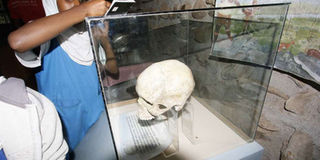National Museums to attract youth through digital collections

A pupil of Kongoni Primary School in Nairobi checks out a skull of a Homo habilis at Kariandusi Pre-historic Site in Gilgil, Nakuru, on June 17, 2014. The National Museums of Kenya plans to digitalise its collections. PHOTO | SULEIMAN MBATIAH | NATION MEDIA GROUP
What you need to know:
- NMK and Digital Divide Data (DDD), Intel and Amazon have signed agreements to develop the online platform.
- It plans to open its collections to the world as it takes advantage of the interwebs to increase engagement.
Soon you could take a tour of the National Museums of Kenya right from your hand-held mobile device, all from the comfort of your home, as the institution embraces the potential the Digital Age offers to reach more audiences.
NMK plans to digitise its collections and open them up to the world as it takes advantage of the interwebs to drive individuals around the world to engage with Kenya’s history and the arts.
“We want to provide a virtual experience that engages people and gets them interested in understanding and learning about Kenya’s cultural and natural heritage by making collections accessible to the public,” Mr Fredrick Manthi, the head of Earth Sciences at NMK, said following the announcement in Nairobi on Wednesday.
RESEARCH
He added: “There are two key audience groups that we are targeting. The first includes ‘Generation Z’ and the Millennials – youth who are digital-first natives, who might never have stepped into the museum but will hence get exposed to Kenyan heritage and world history through the interactive website.
"Many more people, especially the youth, will learn about this rich heritage and, yes, hopefully be inspired to discover more.”
In addition, he said, the worldwide scientific and research community will be able to virtually access complex and detailed data sets, GIS information, 3D models on specimens and artefacts through the digital archive.
"This will act as a catalyst to accelerate research and data analysis and, hopefully, provide opportunities for new research projects and discoveries,” Mr Manthi added.
DIGITAL ARCHIVES
NMK and Digital Divide Data (DDD), Intel and Amazon have signed agreements to develop the online platform.
DDD, a non-profit organisation specialising in transforming content into multi-use digital formats to increase engagement, is the lead architect of the project.
The first phase will involve digitisation of the most culturally and scientifically significant artefacts and fossil specimens, the creation of a digital archives platform and an interactive website (‘virtual museum’).
The platform will be hosted on the Amazon Web Services (AWS) cloud.





